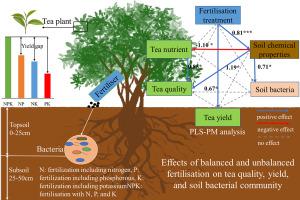Applied Soil Ecology ( IF 4.8 ) Pub Date : 2022-03-03 , DOI: 10.1016/j.apsoil.2022.104442 Sheng Tang 1, 2 , Wankun Pan 1 , Rui Tang 3 , Qingxu Ma 1, 2 , Jingjie Zhou 1 , Nan Zheng 1 , Jun Wang 1 , Tao Sun 1 , Lianghuan Wu 1

|
Unbalanced fertilisation with nitrogen (N), phosphorus (P), or potassium (K) deficiencies suppresses tea growth and is common in tea production. Balanced fertilisation based on the optimal nutrient requirements of tea plants improves tea yield and quality. However, the effects of unbalanced fertilisation on the yield and quality of tea, soil chemical properties, and bacterial community have not been investigated, and the mechanisms affecting the tea yield and quality remain unclear. Therefore, we conducted a five-year field experiment in tea orchards using four combinations of N, P, and K fertiliser and an unfertilised control. Compared with balanced fertilisation, N, P, and K deficiencies led to a 27.3%, 12.9%, and 11.3% reduction in annual tea yield, respectively. In general, N deficiency had a greater impact on the tea quality than P and K deficiencies. Nutrient contents in tea leaves correlated positively and significantly with tea quality (free amino acid and polyphenol contents). Alpha diversity of soil bacteria was lower in N addition treatments. The addition of N altered the soil bacterial community structure significantly and resulted in a lower Bray–Curtis dissimilarity with respect to the unfertilised treatment. Compared to balanced fertilisation, N deficiency inhibited Chloroflexi but favoured Thaumarchaeota growth. P deficiency resulted in a lower relative abundance of Acidobacteria but a higher relative abundance of Proteobacteria. Fertilisation indirectly influenced soil bacteria with the mediation of pH and soil organic carbon and NH4+ contents. This study indicates that N fertiliser input and pH are the main factors affecting tea yield and quality, respectively. Understanding the effects of unbalanced fertilisation on both tea and soil will help to guide fertilisation strategies, improve tea yield and quality, and reduce the environmental impacts of cultivation.
中文翻译:

平衡施肥和不平衡施肥对茶叶品质、产量和土壤细菌群落的影响
氮 (N)、磷 (P) 或钾 (K) 缺乏的不平衡施肥会抑制茶的生长,这在茶生产中很常见。基于茶树最佳营养需求的平衡施肥可提高茶叶产量和品质。然而,不平衡施肥对茶叶产量和品质、土壤化学性质和细菌群落的影响尚未研究,影响茶叶产量和品质的机制尚不清楚。因此,我们在茶园中进行了为期五年的田间试验,使用 N、P 和 K 肥料的四种组合和未施肥的对照。与平衡施肥相比,N、P、K 缺乏导致茶叶年产量分别减少 27.3%、12.9% 和 11.3%。一般来说,缺氮对茶叶品质的影响大于缺磷、缺钾。茶叶中的养分含量与茶叶品质(游离氨基酸和多酚含量)呈显着正相关。施氮处理土壤细菌的α多样性较低。N 的添加显着改变了土壤细菌群落结构,并导致未施肥处理的 Bray-Curtis 差异较低。与平衡施肥相比,氮缺乏抑制 N 的添加显着改变了土壤细菌群落结构,并导致未施肥处理的 Bray-Curtis 差异较低。与平衡施肥相比,氮缺乏抑制 N 的添加显着改变了土壤细菌群落结构,并导致未施肥处理的 Bray-Curtis 差异较低。与平衡施肥相比,氮缺乏抑制Chloroflexi但有利于Thaumarchaeota 的生长。缺磷导致酸杆菌的相对丰度较低,但变形杆菌的相对丰度较高。施肥通过pH、土壤有机碳和NH 4 +含量间接影响土壤细菌。本研究表明氮肥投入和pH分别是影响茶叶产量和品质的主要因素。了解不平衡施肥对茶叶和土壤的影响将有助于指导施肥策略,提高茶叶产量和品质,减少种植对环境的影响。










































 京公网安备 11010802027423号
京公网安备 11010802027423号